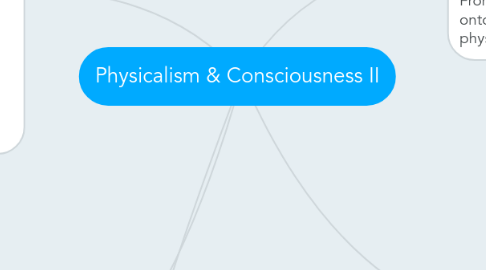Physicalism & Consciousness II
by Anna Bromely

1. Kripke on Identity 1. Identity is necessary. 2.Rigid designators are descriptions of things that don't change in all possible worlds. i.e. water (Disonalogy: that guy is in the corner) 3.Identity statements involve rigid designators both side of is. i.e. water is H20. They can also be posteriori, like scientific reductions 3a.A is identical to B in all possible worlds 3b.Water not being H20 seems conceivable, but isn't possible.
2. Type B physicalism If consciousness is a physical-functional property, then although zombies are conceivable, they are not metaphysically possible. An ontological gap cannot be inferred from an epistemic gap. (we can't assume physicalism is false) Objection: 1.Analogy with water doesn't work 2.Pain picks out a sensation. Why think they can't exist independently? 3.How could 2 diff properties be identical instead of correlated? 1.Imagining water not being H20 involves confusion 2.Conceivability of zombies supports the claim that they are possible - so physicalism is false Reply(Papineau): There is a disanalogy between zombies and water. Objection(Chalmers): The identity between water and H20 can be deduced from physical truths. If there is an identity is must be basic 'primitive principle'. If consciousness is a fundamental property, then physicalism is false.
3. Substance monist alternatives to physicalism 1.Substance monism - only 1 kind of substance 2.Emergentism: property dualism - consciousness is distinct from from physical properties. They have emerged from them 3.Epiphenomenalist property dualism - consciousness has no causal power, zombies are functionally the same as us. 4.Neutral monism/pansychism: Protophenomenal properties underpin physical world.
4. Epistemology & Ontology Zombies and Explanatory gap argument start with Epistemic gap - From physical truths you cannot deduce truths about consciousness. From the gap, the arguments infer an ontological gap - consciousness is not physical
5. Type A physicalism 1. Dennett:There is no epistemic gap 2. Qualities of your experience are physical but your epistemic relation to them is unique 3. Jackson: If one knows all physical facts and phenomenal facts one could deduce all truths about consciousness. 3a. Valid deductive argument - not possible for premises to be true conclusion false 3b.Premises: All physical facts about world. Conclusion: Some facts about phenomenal consciousness 3c. Metaphysical necessity: physical facts cannot be true and phenomenal facts be false Objection: No adequate physical-function analysis of consciousness


